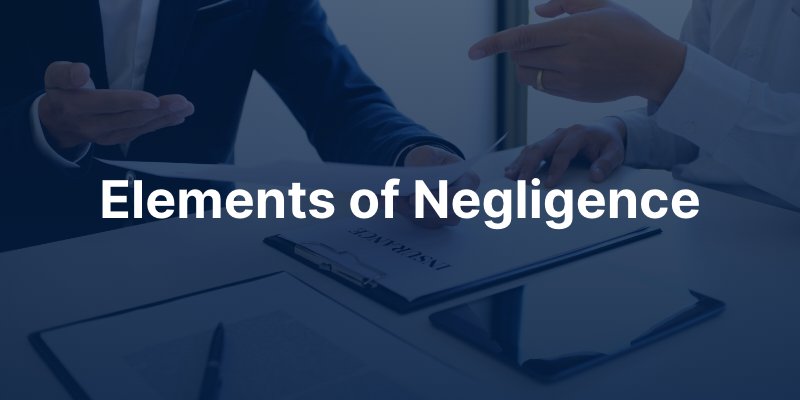What Are the Elements of Negligence?
Request Free ConsultationMost personal injury cases are based on proving negligence on the part of an individual or business entity. When another person or business fails to take reasonable actions to prevent causing harm or fails to act the way a reasonable person would under the same circumstances, their negligence leaves them liable for the victim’s damages.
When you’ve been injured in a preventable accident and have mounting economic damages as well as pain and suffering, it’s important to understand negligence to determine if you have a case.
What Are the Elements of Negligence in Personal Injury Claims?
The victim of a personal injury such as injury from a car accident or a slip-and-fall injury becomes the plaintiff in a personal injury case. It’s the plaintiff’s duty to prove the at-fault party’s (defendant’s) negligence by a preponderance of the evidence. This means showing that it’s more likely than not that the defendant caused the injury. Proving negligence requires effectively demonstrating the at-fault party’s negligence leaves them legally liable for the victim’s damages like medical costs, lost income, and pain and suffering. Personal injury law divides negligence into four elements.

Duty of Care:
Personal injury liability centers around the premise that every person owes a general duty of care toward others. It is our duty to take reasonable measures to prevent causing injuries to others in our orbit. For example, drivers have the duty to follow traffic laws and store owners have the duty to promptly address and repair fall hazards on their store property. To prove negligence, the injury victim must first prove that the defendant owed them a duty of care to act reasonably to prevent harm.
Breach of Duty:
When a person has a duty of care toward another person, like a hotel owner’s duty to provide adequate security, and they fail to uphold that duty, their failure is an act of negligence. They breached their general duty of care toward that person.
Causation:
If a defendant’s negligence doesn’t cause any harm, there is no case for their liability, but if their failure to take reasonable measures causes an injury to someone else, they are liable for any damages the person suffers from the injury. For example, if a driver is texting and rolls through a stop sign, resulting in a collision with a vehicle in the intersection, their negligence caused the accident.
Damages:
The final element of legal negligence is proving that the injury caused damages to the victim. In a personal injury case, the word “damages” refers to the economic and non-economic consequences the injury victim suffers as a direct result of their injury.
Economic and Non-Economic Damages Caused by Negligence
A serious injury quickly disrupts the victim’s life by requiring expensive medical care and recovery time that sometimes prevents a swift return to work. The most serious injuries may result in permanent disability that disrupts or ends the victim’s ability to work at all. Common economic damages caused by negligence in personal injury cases include past and future medical expenses, lost income, and diminished future earning capacity. These damages are fairly straightforward to calculate.
Non-economic damages are not as easy to assign a monetary amount, but they are often the most difficult aspect of the injury. Examples of non-economic damages include “pain and suffering,” emotional trauma, disfigurement, loss of enjoyment of life, and loss of consortium (the ability to enjoy a full physical and emotional relationship with a loved one).
When the evidence proves negligence directly caused damages to the victim, the negligent party is liable for compensating the victim for their damages. Compensation typically comes from an appropriate insurance policy, such as auto insurance after an accident or property liability insurance after a slip-and-fall accident.
If you believe you were injured due to another person’s negligence, contact a St. Louis personal injury lawyer today.
